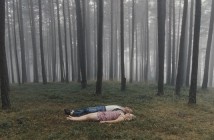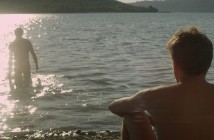
It seems unlikely that Netflix considers a curatorial role in the rights it buys and when, but it’s difficult not to draw a comparison between this week’s new films and the long-standing cinema release practice of counter-programming. Where independent distributors might see the release of the new superhero blockbuster as the ideal time to drop their black-and-white Bolivian existential epic, Netflix here appears to be meeting the draw of the Academy Awards, in all their major-movie glory, with a topic old Oscar is not wont to celebrate: female sexuality. And good for them; it’s weeks like these that give us the strength to plough on through the weaker ones.
Note: March’s first-of-the-month content boom will be covered next week, to give us time to process the deluge. Also out this week is Tyler Perry’s Temptation, but let’s be honest: anyone intending to watch that isn’t likely to do so on account of something I said.

An Afghan Love Story (Full review)
The bitterly ironic American release title of Wajma—an original name that might invite consideration of Wadjda, a fellow Oscar-submission centred on a young woman living under an oppressive patriarchy—is An Afghan Love Story, not inaccurate to the movie’s narrative, but nor appropriate to the drama that unfolds. Debut actress Wajma Bahar plays her namesake with a desperate hope, gleeful as she meets in secret with the man to whom she is to be betrothed. That the as-yet-unofficial engagement has the approval of both sets of parents makes all the more senselessly saddening the outcome of the girl’s pregnancy, which propels the film’s latter half into a makeshift prison movie. Sophomore director Barmak Akram fills a handsome frame in spite of his engaging docu-drama aesthetic; it’s only his writing that lets things down a touch, never entirely investigating the depths of the drama at hand, in spite of a Sundance script win in 2013. WORTH WATCHING.

Blue Is the Warmest Colour (Full review)
Itself once a seeming lock for an Oscar nomination, even a win, Abdellatif Kechiche’s epic of sexual and self-discovery was disqualified on grounds of too late a release in its native France, a shame that nevertheless carries no bearing on the film’s multitude of merits. Its Palme d’Or win at Cannes last year saw the award given to leads Léa Seydoux and Adèle Exarchopoulos alongside Kechiche, an unprecedented gesture that speaks to the extent to which their truly remarkable performances define the movie. These three hours are, to us, as rapid and romantic as the several years they chronicle must be to the (initially) teenage Adèle and Emma, the blue-haired beauty who becomes her guide to the adult world in all manner of respects. Kechiche’s controversially graphic carnal scenes amplify the sexual intensity of the relationship as much as his intellectually-oriented dialogue accentuates the meeting of minds; Blue Is the Warmest Colour is every bit as beautiful and bruising as falling in love. HIGHLY RECOMMENDED.

Fish Tank (Full review)
Andrea Arnold, who won the Live-Action Short Oscar for her excellent Wasp, is not often enough with a movie on our screens. Fish Tank is the second of her three features, a social realist gem perfectly pitched tonally as much as chronically between the urban dystopia of Red Road and the revisionist romanticism of her Wuthering Heights. Newcomer Katie Jarvis gives an extraordinary performance as the streetwise fifteen year-old who forms an unsettling attraction to her mother’s new boyfriend, a figure to whom Michael Fassbender brings muted menace as only he can. It’s a film that proves grittiness needn’t preclude gorgeousness; Arnold and regular DP Robbie Ryan give this world as unlikely an allure as Arnold’s scripting does the character, almost-impenetrably austere. But if ever someone were to crack the shell, it was Arnold: she may don the mantle of her British cinema forebears here, but Fish Tank is a film all of her own. HIGHLY RECOMMENDED.

The Fish Child
Acclaimed Argentine director Lucía Puenzo, whose Wakolda is still making rounds on the festival circuit, followed-up her debut breakthrough XXY with another tale of gender and sexuality in The Fish Child. Expecting of her audience the attention span to keep up, Puenzo weaves a narrative of many layers, opening on the discovery of a judge dead at his desk and following the story up to and from that point thereafter. Inés Efron and Mariela Vitale are quietly compelling as the deceased’s daughter and the family maid, both young girls from drastically different backgrounds whose strange relationship seems to shift across the course of both timelines. It’s a tad messy, truth be told, but never not engrossing; the strange visual metaphor to which the title alludes aside, this is a film that’s strong in spite of its setbacks, interesting enough to keep us guessing even when the character moments wane. WORTH WATCHING.

The Gymnast
There’s nothing much new going on in The Gymnast, Ned Farr’s tale of two women who slowly fall in love across the course of training sessions for an acrobatic show, but that never stops it from being a perfectly nice watch all the same. Dreya Weber is the main draw, whose once-great gymnastics career was cut short by injury, consigning her to a lonely life in a loveless marriage with her family ambitions just as unrealised as her professional ones. Weber face is a feeble façade, barely masking the discontent that lurks behind every look. Addie Yungmee shares the sadness as a closeted Korean adopted into a Jewish family whose innumerable identity issues lend the film a fine sense of the need to belong. Farr’s no master director, but he serves the story at hand; The Gymnast is a sweet, slow tale of love and the difficulty of admitting we need it. WORTH WATCHING.

The Last White Knight
“This is gonna be misinterpreted by some,” suggests the chief subject of The Last White Knight, a sexagenarian member of the Ku Klux Klan whose 1965 assault of the film’s director for trying to help local blacks register to vote prompts, however belatedly, the reconciliation on which this documentary is pitched. But he’s wrong: “this”, his relentless rhetoric that he appreciates the intent of his erstwhile adversaries while still considering them second-class citizens, will by none be interpreted as anything but the venomous bile it is. Paul Saltzman’s film is deeply distressing, not for the history of its Mississippi setting it does well to cover, but for the platform it gives to an ugly old man to espouse his only-slightly toned-down hideousness. Despite the challenges he fails to aptly answer, The Last White Knight is so stuck on an unlikely ending it wants to achieve that it never quite sees how far off-course it’s gone. SO-SO.

The Wait
What beguiling wonder there is to the opening moments of The Wait, M. Blash’s semi-supernatural drama in which a pair of mourning sisters are told over the phone that their just-dead mother will soon arise again. It’s the kind of conceit that might seem kooky if played any less straight than here; Blash brings to the idea an evocative eeriness, borne on the beauty of his shooting style and the rural local in which he sets the story. What he forgets to bring, apparently, is a point: for ten minutes The Wait seems enigmatic; ten later, it’s clear that it’s only empty. With its arresting imagery and near-non-narrative, it’s easy to imagine this as how those who don’t get Malick perceive his pictures; the whispered words of Blash’s short script give Jena Malone and Chloë Sevigny awfully little to work with. What they see in the film is never quite clear; it is, at least, very true to its title. AVOID IT.



